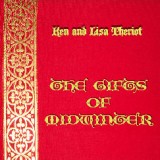
Here is Part 1. We’re going to serialize this due to its length.
We have been threatening to put together a Christmas album for a ridiculous number of years, but when I was moved to write “The Gifts of Midwinter” the project became real. A further ridiculous number of years have passed, but quality takes time. (That’s our story, and we’re sticking to it.)
Since then we have set out to find songs you don’t hear on EVERY Christmas album, though we couldn’t resist putting our stamp on a couple of personal favorites. So here they are, from the sacred to the secular, from medieval to modern. Good Yule and Merry Christmas.
Note: all italicized editor’s notes are by me, Lisa Theriot. All translations are my own (I have trust issues!).
Gaudete
Words and Music (chorus, 4parts): Piae Cantiones, 1582
Music (verses): Jistebnice Cantional, 1420 (?)
I once heard a fighter say that he had been really inspired before a battle because the army was singing together in Latin. Horribly, they were singing this song, the chorus of which translates as “Rejoice, for Christ is born of the Virgin Mary!” I’m a little alarmed that they headed off to shed metaphorical blood singing this song, but I suppose it’s quite the medieval attitude. There is no music for the verses in the Piae Cantiones; the verse melody is usually given as from the Bohemian collection referenced above; however, since I have seen at least three different verse melodies all claim the same source, I remain in doubt until the Czech National Library sees fit to web the collection.
Chorus: Gaudete! Gaudete! Christus est natus Ex Maria Virgine, Gaudete! (repeat)
Tempus adest gratia,
Hoc quod optabamus;
Carmina laticia
Devote reddamus.
Deus homo factus est,
Natura mirante;
Mundus renovatus est,
A Christo regnante.
Ezechielis porta
Clausa pertransitur;
Unde lux est orta,
Salus invenitur.
Ergo nostra concio
Psallat iam in lustro;
Benedicat Domino:
Salus Regi nostro.
Arranged by Ken and Lisa Theriot
©2010 Raven Boy Music
Marmion’s Christmas Song
Adapted from “Marmion”, 1808, by Sir Walter Scott
“Marmion” is an epic poem by Sir Walter Scott set around the time of the Battle of Flodden Field (1513). In the middle, there is a totally unrelated description of a jolly Christmas party. I moved a few bits around and decided that it goes well with the melody from “The Sussex Carol,” which begins, “On Christmas Night all Christians sing…”
On Christmas Eve the bells are rung
On Christmas Eve the mass is sung
The damsel dons her kirtle sheen;
The hall is dress’d with holly green;
Forth to the wood the merry-men go,
All to gather the mistletoe.
Then opens wide the Baron’s hall
To vassal, tenant, serf, and all;
Power lays his rod aside,
And Ceremony doffs his pride.
And to the cottage, as the crown,
Comes good news of salvation down.
The fire, with well-dried logs supplied,
Goes roaring up the chimney wide:
The wassail round, in good brown bowls,
Bedecked with ribbons, blithely trowls.
So mix sobriety with wine,
And good cheer with thoughts divine
Then come the merry maskers in,
And carols roar with blithesome din;
If unmelodious the song,
It is a hearty note, and strong.
Listen, and in their mumming see
Traces of ancient mystery.
And so to merry England then
Old Christmas brings his sport again.
At Christmas broach the mightiest ale;
At Christmas tell the merriest tale;
Let chill winds whistle as they will,
We’ll keep our Christmas merry still.
Words by Sir Walter Scott
From the introduction to Canto VI of “Marmion,”
Dedicated to Richard Heber, Esquire,
and set at “Mertoun House, Christmas.”
Music, traditional, to “The Sussex Carol,” melody
collected from tradition in 1919 by R.V. Williams
(the original lyric for the Sussex Carol was published in Ghent in 1684 in a collection called “Small Garland of
Pious and Godly Songs.”)
Adapted and arranged by Lisa Theriot
© 2010 Raven Boy Music, ASCAP
Cantique de Noël
(Minuit, Chrétiens)